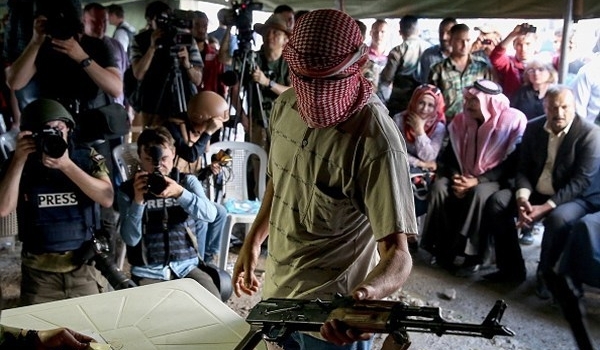
RNA - Syrian people want to get on with their lives in the liberated cities and towns and that’s a fact – including in the de-escalation zones. Regional and international reporters are free to travel to these regions as there are no threats from the Syrian Army or its allies. This includes the cities that gave up their rebellion and ties to the foreign-backed terrorist groups and their affiliates, and surrendered to the Syrian government.
And it’s never been the choice to surrender or starve. The Syrian government is taking care of everyone, including the surrenders and rebel sympathizers who stayed behind and put their fate in the hands of the government. The only problem is that the destruction is massive and every house can count at least one family member killed or wounded. But no one has been imprisoned for that. The rebuilding has begun and many schools have reopened, while other civilian objects have been partially rebuilt. Shops have reopened, even though prices are very high. The army is in control of these cities and towns and it’s business as usual for everyone.
It’s a big lie, therefore, to claim that in some places, like Daraya or Wadi Barada, west of Damascus, the government has expelled the entire population. Those who have remained are unwilling to leave their families, their homes, and the city where they grew up. And no one in the government is ever forcing them to do so. But the official story is seldom told by the “fakestream” media.
Silly how some media lackeys, instead, claim that the Syrian Army’s Fourth Division has bases in these areas that are hosting the army’s chemical warfare department and the infantry squadrons of the army’s chemical department - set up by Rifaat al-Assad, the uncle of President Bashar al-Assad! It’s equally silly to claim that the government’s armed forces have besieged these cities from all sides in order to starve their unfortunate citizens!
All roads to Damascus are indeed open for food, medicine, and fuel. Civilians are free to commute as all the smuggling tunnels have been closed off and all the defensive trenches and barricades that crisscross the cities have been removed. Finally, international reporters and news television networks are allowed to enter these cities and film any report to show that life goes on now that people are back under government rule.
There are no distorted pictures here. The Syrian government and its allies have been true to word. All rebel prisoners have been pardoned and released and no one is going to arrest them again. The flow of food and international aid has sped up, and no one is using food as a weapon to bring pressure on people. Under International Humanitarian Law, the government is also allowing access in order to supply all the basic needs of the populations, including medical and government services.
Long story short, life has now largely returned to normal in many regions across the war-torn country. They are now being provided with their basic needs, including power and water, while government is allowing local infrastructure — including hospitals and schools — to resume operations. Local restaurants and shops are now doing a booming business, while numerous vendors can be seen roaming the streets hawking their wares. The allied forces deployed on the border or the cities, meanwhile, have continued to help local residents return to their homes, with hundreds of thousands civilians having returned to their cities to date.
Last but not the least, hundreds of thousands refugees are also expected to return to Syria from Turkey by the end of 2017, according to a project started as part of cooperation between the Syrian and Turkish governments as well as the United Nations High Commissioner for Refugees. The project overseen aims to normalize daily life in the country. Accordingly, infrastructure works, the opening of bakery shops, the providing of clean water, the maintaining of education services, and the repairing of state-run buildings like hospitals and schools are all part of the nationwide rebuilding and reconciliation efforts.
847/940